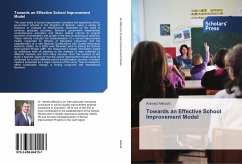
International Handbook of School Effectiveness and Improvement
Review, Reflection and Reframing
Herausgeber: Townsend, Tony
Versandkostenfrei!
Versandfertig in 1-2 Wochen
611,99 €
inkl. MwSt.

PAYBACK Punkte
306 °P sammeln!
This book celebrates twenty years of the International Congress for School Effecti- ness and Improvement. According to Judith Chapman¿s report in the first issue of the Australian Network News (1989, p. 1): The initiative for ICES was taken by Dale Mann, former Chairperson (1976¿85) of the Department of Educational Administration, Teachers¿College, Columbia University, who served as the first Chairperson (1984¿85) for the National Council for Effective Schools in the United States . . . [who] felt it timely to bring policy-makers, researchers and planners together. By mid-1987 eight countr...
This book celebrates twenty years of the International Congress for School Effecti- ness and Improvement. According to Judith Chapman¿s report in the first issue of the Australian Network News (1989, p. 1): The initiative for ICES was taken by Dale Mann, former Chairperson (1976¿85) of the Department of Educational Administration, Teachers¿College, Columbia University, who served as the first Chairperson (1984¿85) for the National Council for Effective Schools in the United States . . . [who] felt it timely to bring policy-makers, researchers and planners together. By mid-1987 eight countries, the USA, England, Wales, Scotland, Australia, Sweden, Canada and South Africa had shown sufficient interest for an international congress to be conducted in late 1987 or early 1988. ¿The planning group at Columbia was int- ested in a Congress in two parts: (1) a conference on school effectiveness open to all with an interest and with papers presented in the normal fashion for such events, and (2) a decision-making meeting at which the organization would be formally cons- tuted and decisions made. ¿ (Chapman, 1989, p. 1) In January 1988, the first Congress was held at the University of London. Policy makers, practitioners and scholars from 14 countries, including the initial 8, together with Germany, Hungary, Ireland, Israel, the Netherlands and Norway, attended the Congress and adopted the name ¿International Congress for School Effectiveness.












